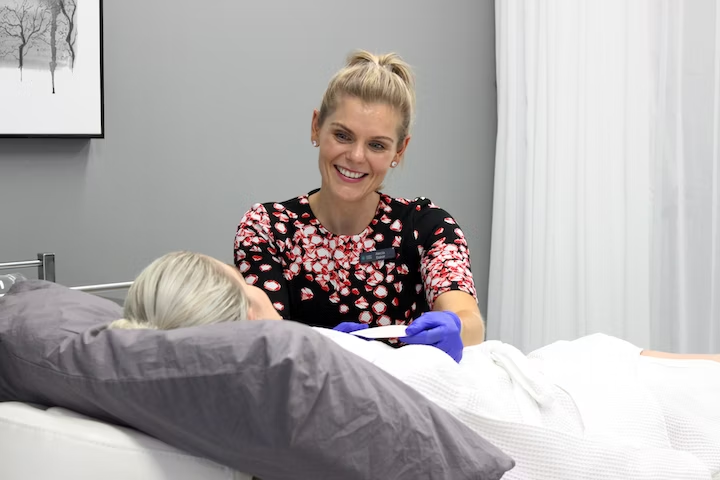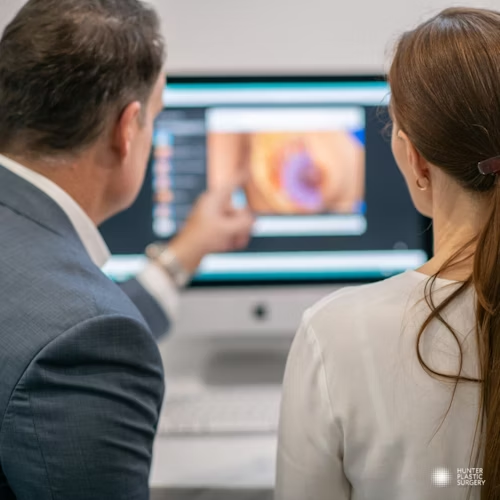During the post-surgery recovery period, some of the most common questions our team receive are, “have I put on weight?” and “why is my stomach bloated?”
The truth of the matter is that symptoms such as swelling, stomach distention and abdominal discomfort are very common after surgery. The good news is that these sensations are only temporary. Phew! Post-operative bloating and swelling usually peaks 48 hours after surgery, but will mostly subside by the 12-week mark.
Why does bloating and swelling happen after surgery?
There are many causes of stomach bloating and swelling after surgery.
1. The lymphatic system has been disrupted
Swelling occurs in the body as the lymphatics have been surgically disrupted. However, it is important to remember that swelling is an important part of the recovery process and is essential for healing! The swollen areas actually contain white blood cells and proteins that are needed to heal the surgical area.
2. Functions of the gastrointestinal tract slow down
Anaesthetic, pain relief, antibiotics and other medications all tend to have a “slowing” effect on the gut. The often means that you will experience post-operative constipation, which of course can lead to bloating and discomfort.
3. IV fluids
During your operation, you will receive intravenous fluids to replenish your body’s fluids and balance your sodium levels. The IV fluid can cause some bloating while your body regulates its fluid levels post-operatively.
4. You can’t move around as much as usual
When recovering from major surgery, you are simply not able to move around as much as you regularly would. This decrease is mobility can lead to fluid retention and increase your swelling and bloating symptoms. Without being able to participate in the physical activity you usually would, you may even recognise a small weight gain. This is completely normal! Once you have the all clear to begin gentle movement and exercise, you will find that your weight returns to its regular state.
What can I do to help reduce the bloating?
Post-surgical bloating and swelling is mostly eased with time. Although most swelling and bloating will clear by 12 weeks, you may find that swelling ebbs and flows for up to 12 months after surgery. Some ways you can help ease swelling, bloating and stomach discomfort are:
- Gentle mobilisation (i.e. walking) when you have the clearance to do so
- Increase your fluid intake to flush the excess fluid from your body
- Ensure your post-surgical diet is rich in fibre to aid bowel movements
- Gentle stool softeners (such as Movicol sachets) can be utilised to help with post-surgery constipation and belly bloat
- Cease stronger pain medication as soon as practical and replace with those that are gentler on the gut such as paracetamol. It is important to note that post-surgical bloating and swelling cannot be improved with prescription medication.
- Keep wearing your surgical garment to help minimise swelling.
Although it’s uncomfortable, rest assured that post-surgical bloating and swelling is a completely normal part of the recovery process and will subside over time. If you have any questions about your recovery process, please do not hesitate to contact myself and our friendly team on 4920 7700.
Other blogs you might like
- Dressings and discharge after plastic surgery
- Recovering from a tummy tuck
- Minimising surgical scars
- When can I exercise after plastic surgery?

Blog Author:
Alecia Baker, Practice Nurse, Hunter Plastic Surgery
About Alecia
Alecia is a Practice Nurse at Hunter Plastic Surgery and has worked closely with Dr Nick Moncrieff, Specialist Plastic Surgeon in Newcastle, since 2018. She is a Registered Nurse with extensive experience in nursing and patient management in some of the busiest hospital settings in the Hunter! She really cares about helping our patients become healthy and happy. Her kind and calm manner help them feel comfortable during their journey with us.
Learn more about our Cosmetic Plastic Surgery Clinic



